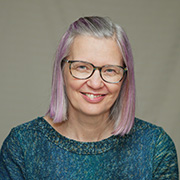Janet Bjorndahl has been an ally of the LGBTQ2S+ community since she was 19 years old, but it was during her time at Luther College University that she gained the knowledge and confidence she needed to do social justice work. “Engaging with and being encouraged by the people I encountered at Luther nudged me to say, ‘This is what my commitment is and what I’m going to do with my life,’” she says.
“My parents instilled social justice values in me, and Luther helped to strengthen and confirm them. I grew up with two gay brothers, so being an ally is very important to me. But I’m a strong introvert and naturally shy—I needed the support I found at Luther to help me find my voice,” she notes. A friend of hers was a Lutheran pastor who was in the closet. He wanted to bring Lutherans Concerned—a group supporting LGBTQ2S+ people in the Lutheran Church—to Canada but was unwilling to be the spokesperson. Bjorndahl helped by becoming one of the first co-chairs of Lutherans Concerned in Canada in the early 1980s. In 1999, she was part of a panel speaking to the national convention of the Evangelical Lutheran Church in Canada. Now that society has become more accepting of the LGBTQ2S+ community, Bjorndahl is turning her attentions to other pressing issues. “I feel the call of Truth and Reconciliation; I’m currently trying to find my place in that,” she explains.
Bjorndahl continues to be involved in Luther College, sitting on the Board of Regents since 2015, currently as Vice Chair. “I was very honoured to be asked to serve on the board and be able to give back,” she says. The board gave her the opportunity to attend conferences on equity, diversity and inclusion, as well as environment, social and governance (ESG) principles, and she has become an advocate for these focuses at Luther. “ESG is getting attention these days because shareholders and customers are demanding it, and companies are discovering that ESG principles can help them be more successful. Of course, many of these principles have been embraced by Luther for years, but it is always good to reflect on what else can be incorporated,” she says.
Bjorndahl has been a donor to Luther for more than two decades. “My university education was heavily subsidized, and I think it is important to pay that forward. Students who can’t afford tuition should be able to go without financial barriers,” she says. “Education is such a leveller in society. Everyone deserves the opportunity to be successful in their work and in their life.”
One of the aspects of studying at Luther that Bjorndahl appreciated most was the ability to talk about her spirituality and beliefs without being mocked. “I encountered that in the workplace—mentioning I was in a church choir and being scoffed at. At Luther, you could talk about being a member of the church, you could talk about your faith and how it related to your understanding of social justice, the world and empathy for other people.”
After earning a Bachelor of Science in mathematics and computer science from Luther College, Bjorndahl went on to a career in IT for a variety of organizations, from a small non-profit in Saskatoon to a leading-edge consulting firm in California. She worked longest at Augustana University College— formerly a Lutheran college in Camrose, Alberta, now part of the University of Alberta—and at Farm Credit Canada, which she retired from in 2019. “Having worked at Augustana and having gone to Luther, I’m convinced that a liberal arts education is very important to our society, especially these days with extreme points of view. We need to support critical thinking and listen to each other,” she says.
After the positive experience that Bjorndahl and her husband, Sterling (U’79), had at Luther (they also met there!), it made sense to send their daughter, Judith (HS’13, U’17), to Luther College High School. “I thought it would be a good environment for her, to be with people who were engaged with learning, and she wanted to go. It turned out to be an excellent choice. She loved the sense of community and acceptance of differences. She made new friends, was in choir and musicals each year, related well to teachers and did well in her classes.” Judith also went on to Luther College for university.
“Luther is a great place to go, a great place to be a part of a community,” Bjorndahl concludes. “It offers wonderful learning opportunities, including [at the High School] opportunities in the arts, sports and community service. And students have the opportunity to learn about social justice, increase their empathy, and explore their interests and leadership opportunities. Academics are important, but so is the whole person.”
